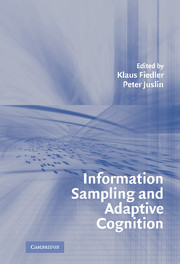Book contents
- Frontmatter
- Contents
- List of Contributors
- PART I INTRODUCTION
- PART II THE PSYCHOLOGICAL LAW OF LARGE NUMBERS
- PART III BIASED AND UNBIASED JUDGMENTS FROM BIASED SAMPLES
- PART IV WHAT INFORMATION CONTENTS ARE SAMPLED?
- PART V VICISSITUDES OF SAMPLING IN THE RESEARCHER'S MIND AND METHOD
- 16 Which World Should Be Represented in Representative Design?
- 17 “I'm m/n Confident That I'm Correct”: Confidence in Foresight and Hindsight as a Sampling Probability
- 18 Natural Sampling of Stimuli in (Artificial) Grammar Learning
- 19 Is Confidence in Decisions Related to Feedback? Evidence from Random Samples of Real-World Behavior
- Index
- References
18 - Natural Sampling of Stimuli in (Artificial) Grammar Learning
Published online by Cambridge University Press: 02 February 2010
- Frontmatter
- Contents
- List of Contributors
- PART I INTRODUCTION
- PART II THE PSYCHOLOGICAL LAW OF LARGE NUMBERS
- PART III BIASED AND UNBIASED JUDGMENTS FROM BIASED SAMPLES
- PART IV WHAT INFORMATION CONTENTS ARE SAMPLED?
- PART V VICISSITUDES OF SAMPLING IN THE RESEARCHER'S MIND AND METHOD
- 16 Which World Should Be Represented in Representative Design?
- 17 “I'm m/n Confident That I'm Correct”: Confidence in Foresight and Hindsight as a Sampling Probability
- 18 Natural Sampling of Stimuli in (Artificial) Grammar Learning
- 19 Is Confidence in Decisions Related to Feedback? Evidence from Random Samples of Real-World Behavior
- Index
- References
Summary
The capacity to learn implicitly complex structures from exemplars of this structure underlies many natural learning processes. This process is occasionally called grammar induction, whereby a grammar can be any structure or system generating exemplars. The most striking example of this process probably is natural language grammar induction: children learning (to use the rules of) the language of their caregivers, by exposure to utterances of this language. This case of grammar induction has been argued by linguists to be such a complex task that its occurrence cannot be explained without invoking a special inborn language device, containing prior information about these natural grammars. The contribution of experience, then, is to provide the learner with additional information needed to “set the parameters” of this device. This is the well-known linguistic position (Chomsky, 1977; Pinker, 1989).
The nativist view was put forward as an alternative to the empiricist position, explaining language learning as a process of imitation and conditioning on the basis of verbal stimuli (Reber, 1973). According to linguistics, the psychological position cannot fully explain the acquisition of the rules of natural grammar because the sample of exemplars to which a child is exposed during the language-acquisition period is demonstrably insufficient to master all these complex rules. This argument against the experience-based explanation of grammar acquisition is known as the “poverty of stimuli” argument (Chomsky, 1977; Haegeman, 1991; Marcus, 1993; Pinker, 1994).
Information
- Type
- Chapter
- Information
- Information Sampling and Adaptive Cognition , pp. 440 - 455Publisher: Cambridge University PressPrint publication year: 2005
